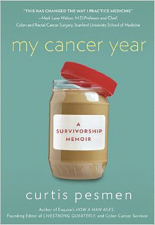
Bookmark
Title: My Cancer Year: A Survivorship Memoir
Author: Curtis Pesmen
Publisher: Tatra Press
Publication date: November 2013
Price: $15.95; paperback, 149 pages
Curtis Pesmen is a well-regarded writer who has authored six books of nonfiction as well as numerous articles for publications such as Esquire and The New York Times. He also has served as founding editor of LIVESTRONG Quarterly and often speaks and writes on patient advocacy.
Shortly after turning 40, he was diagnosed with stage III colorectal cancer. The shock of his cancer diagnosis kick started a journey of second and third opinions, treatment after treatment, and finally recovery. Mr. Pesmen describes his cancer ordeal in a slim book titled My Cancer Year: A Survivorship Memoir, offering insights and advice along the way.
“At first, I thought it was the lousy British food. I had landed in London in mid-June and succumbed to a wicked case of jet jag. Or so I thought. A week, 2, then 3 went by, and still I wasn’t sleeping through the night. Restless, not in any pain, just not sleeping, and I hadn’t been eating all that well, either.” So begins My Cancer Year.
And it’s a good way to open a memoir about cancer because it deftly captures the subtle way disease can first present symptoms. Mr. Pesmen then begins to experience cramps, diarrhea, and noticeable weight loss. He had had colitis and figured he was experiencing a flare-up, so he visits a doctor in London, who performs a digital rectal examination, finding traces of blood on his gloved finger. Mr. Pesmen flies home and gets a full examination from his gastroenterologist.
The Inflection Point
Capturing the moment when a cancer diagnosis is delivered is the inflection point of every cancer memoir. Virtually all patients share a common experience of numb shock, a flurry of emotions, followed by a somber realization that their lives have just been changed forever. However, the way that experience is framed in a book varies greatly. Age, time and place, life situation, and the kind of cancer affect how hearing a cancer diagnosis is handled.
Mr. Pesman, who hears the bad news on page 2—an odd decision because it robs the reader of the opportunity to get to know him prior to his diagnosis—chose an equally odd format: a mock film script.
Film-Script Format
The Diagnosis [part 1]
INTERIOR: Master bedroom of our Boulder, Colorado, home, focus on phone on nightstand.
CUE SOUND: Phone rings.
This continues until his gastroenterologist says, “I’ve got some bad news. It turns out the pathologist found some cancer cells in there. I am really sorry.”
His reaction: “I am stunned but do not cry. Instead, my body convulses slightly…. I feel like I’ve been in a minor car wreck.”
From there, he takes the reader through an intimate journey, as he breaks the news to his wife (an Oscar-winning producer, perhaps why he chose the film-script format), parents, siblings, and friends. He does a good job; the reader feels for each person who hears a loved one has cancer.
Choosing Brevity Over Content
Although he wisely drops the truncated film-scrip format, the author, perhaps a reductionist by nature, serves up his book in short chunks, some only a paragraph long, each one named. Oncologists are central characters in cancer memoirs, and Mr. Pesmen runs the gauntlet of opinions, finally settling on a surgeon. Prior to surgery, he undergoes fluorouracil adjuvant therapy, delivered via a portable infusion pump, which allows him to take treatment at home. That’s a quality-of-life issue that deserved more attention, as did the conversations he had with various doctors. This was followed by radiotherapy, leading up to his surgery: a total colectomy. The important details of his treatments are lost in his writing format, choosing super brevity over content.
[The author] is at his best when discussing the lifestyle changes that cancer forces on survivors. There are multiple callouts with advice for newly diagnosed cancer patients and survivors.—
Tweet this quote
Mr. Pesmen seems to feel the need to give lifesaving treatments and oncologists short shrift, which is unfortunate because he went into remission and is currently a long-term survivor. He is at his best when discussing the lifestyle changes that cancer forces on survivors. There are multiple callouts with advice for newly diagnosed cancer patients and survivors. There is nothing new here.
Toward the book’s close, the author touches on his relationship with Lance Armstrong, just as he was falling from grace, which is a bit chatty but entertaining. Mr. Pesmen is an accomplished writer and perhaps should have valued content over trying too hard for an original style. This book is not recommended for readers of The ASCO Post. ■

